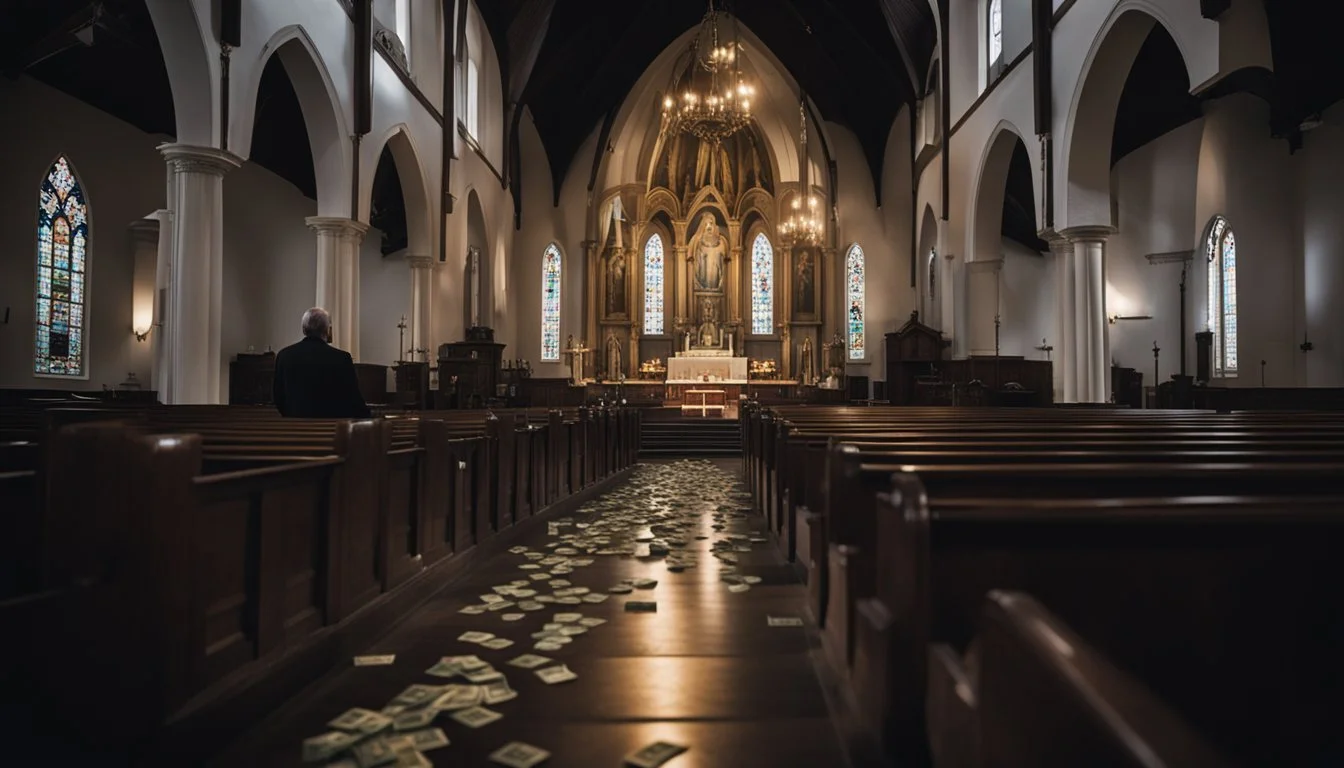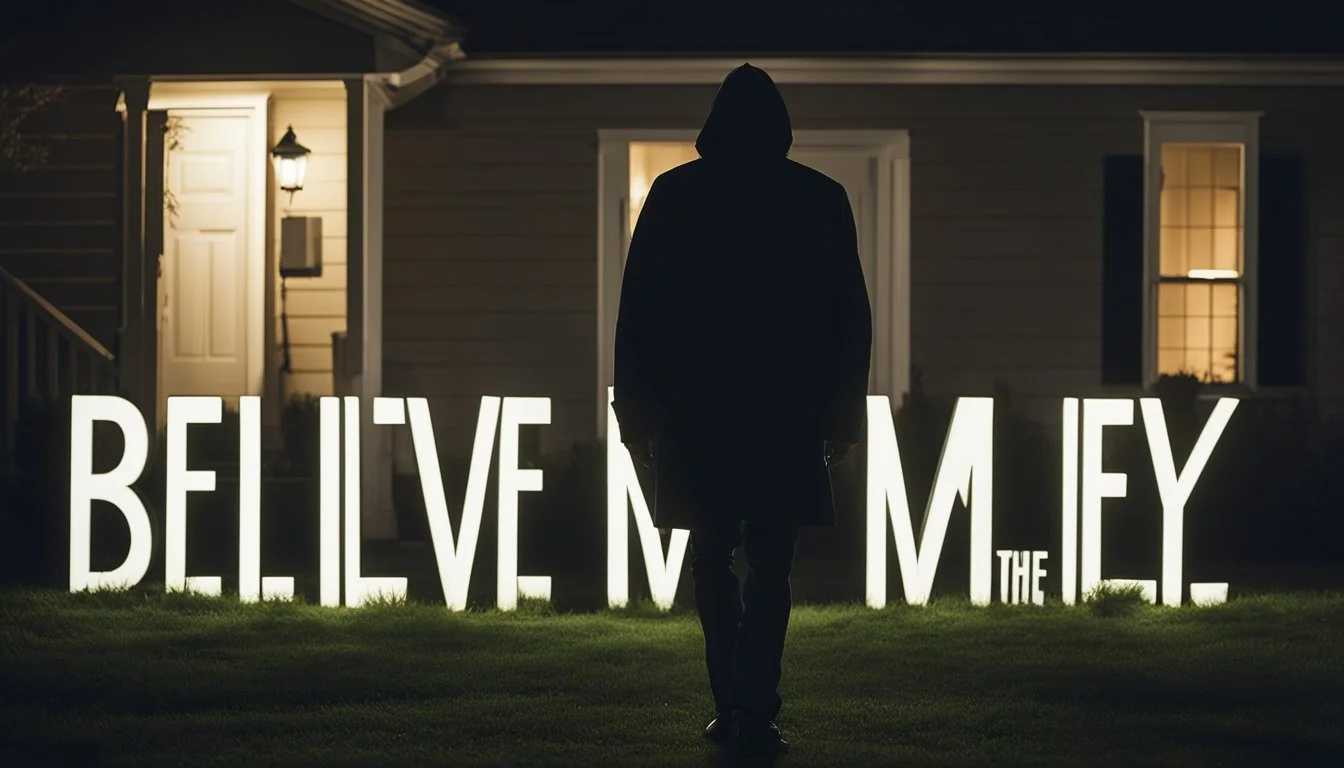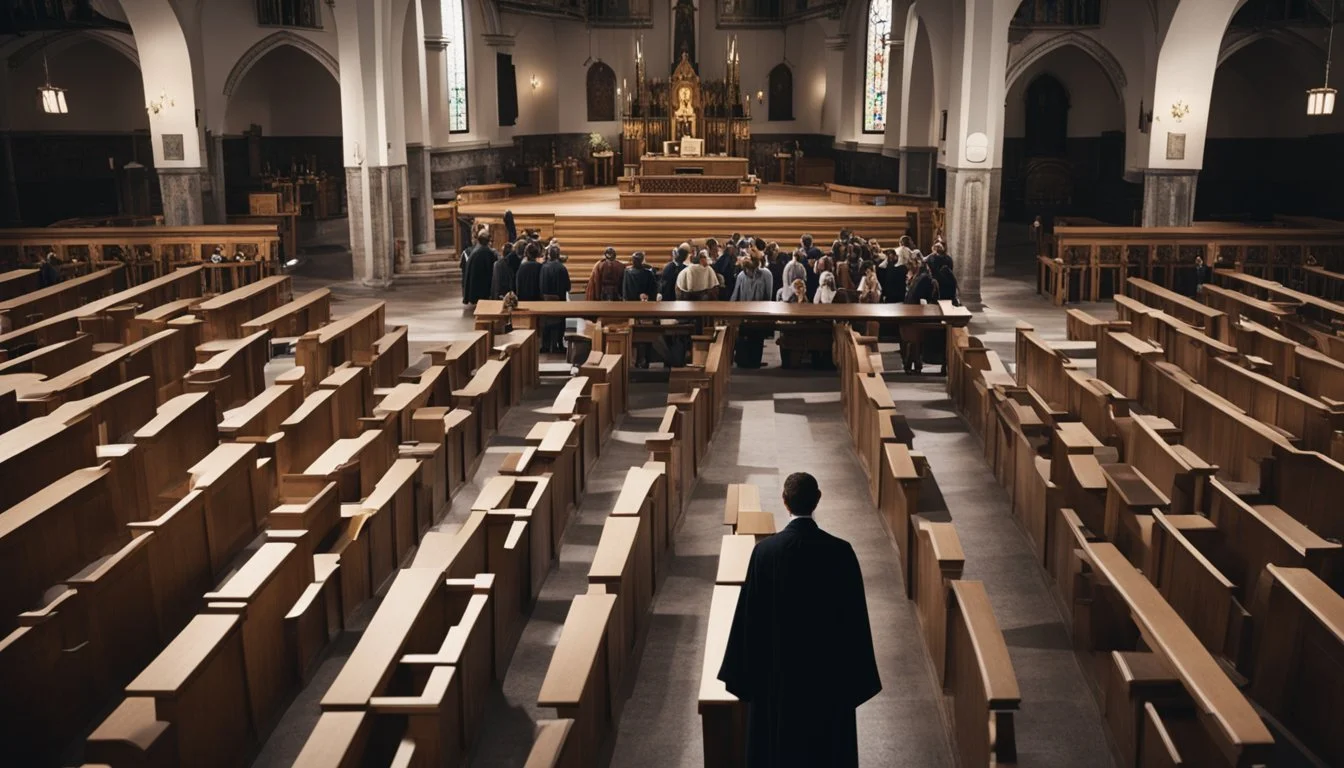10 True Crime Documentaries About Fake Charities in Religious Organizations
Exposing Deceit
True crime documentaries have captivated audiences with their in-depth examinations of real-life criminal cases. Among the most shocking and thought-provoking are those that uncover fraud within religious organizations.
These documentaries reveal how individuals exploit trust and faith to misappropriate charitable funds intended for noble causes. Viewers will gain insight into the intricate schemes, the people behind them, and the far-reaching impact of these deceptive practices on communities and believers alike.
1) The Most Hated Woman in America (2017)
"The Most Hated Woman in America" tells the story of Madalyn Murray O'Hair, an ardent activist and the founder of American Atheists. Born in 1919, O'Hair gained national attention for her role in the landmark 1963 Supreme Court case that ended mandatory Bible readings in public schools.
O'Hair's tenacious pursuit of the separation of church and state made her a polarizing figure. She was frequently seen on talk shows, debating religious figures and defending her beliefs. Her outspokenness earned her the title "the most hated woman in America," as dubbed by Life magazine.
In the 1990s, O'Hair's life took a darker turn. She was kidnapped along with her son and granddaughter. The trio was held for ransom and met a tragic end. This shocking turn of events is explored in the 2017 film, which blends elements of true crime and biographical drama.
Directed by Tommy O'Haver, the film stars Melissa Leo as O'Hair. Leo’s portrayal captures the complex nature of a woman who fought fervently for her convictions, despite the intense public backlash.
More about the film and Madalyn Murray O'Hair’s life can be found on IMDB and Wikipedia.
2) American Scandal: Charity Case
In “American Scandal: Charity Case” (2015), viewers are taken into the world of charity fraud within religious organizations.
This documentary highlights the intricacies of schemes that prey on the faithful and charitable. Specific cases show how funds meant for noble causes were diverted for personal gain.
Particularly, it examines how some individuals present themselves as religious leaders to win trust and donations. The manipulation of faith and trust often leads to substantial financial losses for unsuspecting donors.
The film is thorough in revealing methods used by fraudsters to establish credibility, such as fake documentation and well-rehearsed emotional appeals. Audits and testimonies illustrate the extent of the deceit and its impact on communities.
For more information on “American Scandal: Charity Case,” visit IMDb.
3) Sins of Our Mother (2022)
"Sins of Our Mother" is a true crime docuseries available on Netflix. It explores the unsettling case of Lori Vallow, also known as the "Doomsday Mom."
The series delves into the numerous unexplained deaths connected to Vallow, who believed people could be possessed by evil spirits.
The show portrays her journey from a devoted mother to a member of a doomsday cult.
The documentary provides a chilling insight into how religious fanaticism can lead to dangerous behaviors. Vallow is currently awaiting trial, highlighting the ongoing legal ramifications of her actions.
This series stands out due to its use of archival footage and detailed storytelling, making it a compelling watch for true crime enthusiasts.
For more information, visit the IMDB page.
4) Charlatan: The Pious Fraud
"Charlatan: The Pious Fraud" (2017) explores the unsettling world of fraudulent religious charities. This documentary sheds light on the cunning individuals exploiting sincere believers for financial gain. It dives into the intricate schemes these fraudsters use to gain trust and manipulate their victims.
Viewers get an inside look into the operations of these fake charities. The film presents interviews with whistleblowers and former members who reveal the emotional and financial toll taken on the unsuspecting faithful. The stories are both sobering and eye-opening.
The documentary also examines how these fraudulent activities are often hidden under the guise of religious piety and charitable intentions. By meticulously uncovering the layers of deceit, "Charlatan: The Pious Fraud" brings attention to a serious issue often overlooked by mainstream media.
For those interested in learning more, the film is available for additional details on its IMDb page.
5) A Thief in the Night (2014)
"A Thief in the Night" (2014) delves into the shadowy activities of individuals exploiting religious organizations for personal gain. This documentary highlights several cases where trusted members of religious communities betrayed the trust of their congregations.
The film details how these individuals manipulated beliefs and emotional connections to solicit large donations. They promised that the funds would go toward noble causes but instead diverted them for personal use.
Religious faith played a significant role in these scams, making it easier for the fraudsters to gain and abuse trust. Congregation members often found it hard to believe that respected figures could be capable of such deceit.
Throughout the documentary, interviews with investigators and victims reveal the emotional and financial toll these scams took on communities. The film serves as a stark reminder of the potential for abuse within trusted institutions.
For more information, you can visit the IMDb page for "A Thief in the Night".
6) Believe Me: The Abduction of Lisa McVey (2018)
"Believe Me: The Abduction of Lisa McVey" is a true crime film directed by Jim Donovan. It tells the harrowing story of 17-year-old Lisa McVey, who was abducted in 1984 by serial killer Bobby Joe Long.
Lisa McVey survived her capture by using reverse psychology, eventually securing her release. Upon her return, few believed her story, highlighting a tragedy within a tragedy.
Starring Katie Douglas, Rossif Sutherland, and David James Elliott, this film provides a compelling and intense portrayal of Lisa's ordeal. It explores themes of survival, trauma, and vindication.
This film was initially released on Lifetime in the United States and by Showcase in Canada. It later gained a wider audience through Netflix in 2021.
For more information, visit IMDB.
7) The Lost Prophets: Fraudulent Faith
The Lost Prophets: Fraudulent Faith uncovers the unsettling case of the Welsh rock band Lostprophets and their entanglement in scandal and controversy. Lead vocalist Ian Watkins and the band initially gained fame but later became infamous for Watkins' shocking criminal actions.
This documentary delves into the facade of the band's success, revealing how Watkins used his position to exploit fans and engage in illegal activities. The film sheds light on the darker side of fame and the betrayal felt by the band's followers.
Through interviews and investigations, the documentary highlights how Watkins deceived both his bandmates and the public. It also examines the broader implications for fans who placed their faith in the band, only to be met with profound disillusionment.
The Lost Prophets: Fraudulent Faith serves as a stark reminder of how deceit can be disguised under the veil of religion and fame. It offers insights into the psychological manipulation and control exercised by figures of authority within popular culture.
For more information on the Lostprophets scandal, visit Lostprophets on Wikipedia.
8) Pray for Us: Exposing Charity Cheats
"Pray for Us: Exposing Charity Cheats" (2020) is a hard-hitting documentary that uncovers misleading practices within religious charity organizations.
It shines a light on individuals exploiting the faith and generosity of congregations to siphon funds for personal gain.
Through detailed investigations and interviews, the film dissects several cases where money intended for noble causes ended up in questionable hands.
Viewers are taken through real-life instances where religious leaders misused donations, betraying the trust of their followers.
The documentary not only reveals the fraud but also discusses the widespread impact on communities and the challenges in holding these figures accountable.
By highlighting legal and ethical breaches, it emphasizes the need for transparency and regulation in charity organizations tied to religious institutions.
For more information on "Pray for Us: Exposing Charity Cheats," visit IMDb.
9) Suffer the Children: Religious Scams
"Suffer the Children: Religious Scams" (2012) sheds light on the exploitation of children through fraudulent religious charities. This documentary examines how some organizations misuse religious sentiment to gather funds under the guise of helping children, only to divert the money for personal gain.
The film focuses on specific cases where trusted religious leaders and institutions betray the trust of their followers. Viewers are introduced to heart-wrenching stories of children who were promised better lives but ended up as mere pawns in a financial game.
By highlighting real-life scenarios, the documentary reveals a pattern of deception and manipulation. It emphasizes the devastating impact on not just the children, but also the trusting donors who believed they were making a positive difference.
For more details about "Suffer the Children: Religious Scams" (2012), visit IMDb.
10) Faith and Fraud: The Ponzi Pastor
"Faith and Fraud: The Ponzi Pastor" (2023) delves into the extraordinary tale of a charismatic pastor who manipulated his congregation through promises of heavenly returns.
The documentary exposes the pastor's elaborate Ponzi scheme, where he convinced his followers to invest significant sums of money, expecting miraculous profits.
The pastor presented himself as a divinely guided financial adviser, leveraging his trusted position.
Hundreds of his followers, driven by faith and blinded by trust, invested their life savings.
As the scheme unraveled, the community faced financial ruin and deep emotional betrayal.
The film interviews victims and law enforcement officials, shedding light on the pastor’s deceptive tactics and the devastating impact on the community.
It stands as a cautionary tale of how religious authority can be exploited for financial gain. Learn more on IMDb.
The Rise of Fake Charities in Religious Organizations
Fake charities within religious organizations have become a growing concern, exploiting both the faith of followers and their desire to help others. This section examines the historical roots, methods used, and the effects on communities.
Historical Background
Instances of deceptive practices in religious organizations are not a new phenomenon. Historical records show that manipulative leaders have taken advantage of their congregations' trust and financial contributions for centuries.
Examples include the 19th-century spiritualist movements, where leaders frequently solicited donations under fraudulent pretenses. More recent cases have seen organizations setting up fake charities, claiming to support causes aligned with their religious beliefs but instead diverting funds for personal use.
Common Tactics and Techniques
These fraudulent schemes often involve misappropriating funds or creating fake organizations to solicit donations. Scammers exploit the inherent trust within religious communities.
Some techniques include creating fake websites, using emotional appeals during services, and sending mail solicitations under the guise of well-known religious charities. Additionally, scammers might use pyramid schemes disguised as charitable donations to draw in unsuspecting followers, promising divine rewards in return for financial contributions.
Impact on Communities
The impact on affected communities is profound. Financially, people lose savings intended for genuine charitable work, eroding their trust not only in the specific organization but in charitable giving altogether.
Emotionally, betrayal by a trusted religious entity can be devastating, leading to disillusionment with the faith itself. Communities may also see a decline in voluntary contributions, affecting legitimate projects that rely on community support. This erosion of trust can take years to rebuild, leaving long-lasting scars on the social fabric.
In conclusion, fraudulent activities within religious organizations have far-reaching consequences. Historical examples underscore its persistence, while the methods used reveal the calculated manipulation at play.
Identifying and Preventing Charity Fraud
When dealing with charity donations, it is crucial to be aware of potential fraud. Recognizing common red flags, implementing best practices, and taking legal recourse when necessary can protect one's contributions from being misused.
Red Flags to Watch For
Be wary of charities that:
Pressure for Donations: Legitimate charities give time to research and reflect.
Lack Transparency: Genuine organizations openly share information about their mission, programs, and finances.
No Evidence of Tax-Exempt Status: Verify their status on the IRS website.
Have Similar Names to Established Charities: Scammers often use names that closely resemble reputable organizations.
Unsolicited Communication: Be cautious if first contact is through unexpected emails or calls.
Best Practices for Donors
Donors should follow these practices to ensure their contributions reach legitimate causes:
Research the Charity: Use resources like GuideStar, Charity Navigator, and the Better Business Bureau's Wise Giving Alliance to check the charity's credentials and reviews.
Request Documentation: Ask for proof of tax-exempt status and detailed information about the charity's mission and projects.
Donate Securely: Prefer to donate via credit card or check rather than cash. Secure online payment platforms offer additional layers of protection.
Check for Third-Party Moderation: Look for independent audits and financial statements on the charity's website.
Be Skeptical of High Salary Requests: Question any demand for substantial upfront donations claimed to go to administrative costs.
Legal Recourse and Reporting
If fraud is suspected, take swift action:
Document Everything: Keep all communication records, receipts, and other relevant documents.
File a Complaint: Report to the Federal Trade Commission (FTC) and the Internet Crime Complaint Center (IC3).
Contact the State Attorney General: Each state has a process for investigating and prosecuting charitable fraud.
Inform the IRS: Use Form 13909, the Tax-Exempt Organization Complaint (Referral) Form, to notify the IRS of potential abuse.
Seek Legal Advice: Obtain guidance from a lawyer specialized in charitable fraud if needed.
These steps can help safeguard contributions and hold fraudulent actors accountable.












